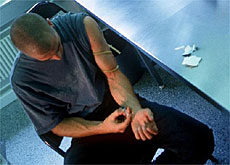Zurich revises its drugs strategy

The city of Zurich says its pioneering drugs strategy has been a success but must now be adapted to meet other challenges.
Authorities in Switzerland’s largest city admitted on Thursday that they had been so busy tackling the open heroin scene that other areas of addiction had missed out.
The assessment comes ahead of next month’s vote in Zurich on whether to maintain the city’s heroin prescription programme.
After concentrating on the heroin problem for the past ten years, the city now wants to be more active in other areas, including encouraging the reintegration of drug addicts.
In a report entitled “Zurich city policy on drugs and addiction”, the city government analysed the results of its strategy since the end of the open drugs scene around the disused Letten station in 1994.
The report, which was demanded by the city parliament, also outlines future strategy.
“We concentrated our efforts so much on the problems linked with the open [drugs] scene that we neglected other aspects,” commented social affairs director Monika Stocker.
She added that even though the strategy had been successful, bringing about the disappearance of places where heroin was sold and injected, it had to be brought up to date.
Disappearing drug scenes
The city of Zurich has a four-pillar strategy, which includes prevention, repression, survival help and therapy.
Support, in particular, should now be given to heroin addicts across the city, said the report.
Zurich wants to put the accent on reintegration. But this is considered difficult in a climate in which companies continue to close their doors to addicts, and in which the city has SFr3.1 million ($2.46 million) less at its disposal from the canton’s coffers because of cost-cutting measures.
The authorities are also going to keep a closer watch on other drugs. While heroin consumption is on the decline, the use of cocaine and ecstasy is on the increase.
Cannabis users, who have until now been under scrutiny by the police and the law, are also to be supervised more closely.
Advice centres
“In order to face the changes in consumption, advice centres have to become more multipurpose,” explained Robert Neukomm, who is responsible for health matters.
The idea is that every addict, whether a consumer of cocaine or alcohol, should be able to get advice.
“We really have to stop differentiating between legal and illegal drugs,” he explained.
Neukomm argued that new solutions had to be found for cocaine addicts who were unemployed and living on the fringe.
“For these addicts, we are at the same point as we were with heroin ten years ago,” he said. But he pointed out that Zurich could not act alone.
Pilot project
A pilot project for the distribution of cocaine under prescription is underway in the city but it is not being supported for the time being by the Federal Health Office in Bern.
However, the office is backing pilot projects in Bern and Basel distributing a substitute drug, Ritalin.
The Zurich authorities also plan to step up prevention measures with young people, particularly those who are jobless.
As far as repression is concerned, the city government is in favour of banning addicts, from certain districts, whatever their nationality, if they are a public nuisance.
swissinfo with agencies
There are about 30,000 consumers of heavy drugs in Switzerland.
About 2,500 addicts have been treated in medically-controlled heroin programmes.
18,000 addicts are being treated using methadone as a substitute therapy.
City authorities in Zurich are revising their ten-year-old drugs strategy, which they believe has been a success.
They admit that concentrating efforts on ending the open drugs scenes led to neglect in other areas.
The city’s health director, Robert Neukomm, argues that there should be no differentiation between legal and illegal drugs.

In compliance with the JTI standards
More: SWI swissinfo.ch certified by the Journalism Trust Initiative



You can find an overview of ongoing debates with our journalists here. Please join us!
If you want to start a conversation about a topic raised in this article or want to report factual errors, email us at english@swissinfo.ch.